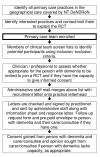Evidence-based interventions in dementia: A pragmatic cluster-randomised trial of an educational intervention to promote earlier recognition and response to dementia in primary care (EVIDEM-ED)
- PMID: 20146803
- PMCID: PMC2829558
- DOI: 10.1186/1745-6215-11-13
Evidence-based interventions in dementia: A pragmatic cluster-randomised trial of an educational intervention to promote earlier recognition and response to dementia in primary care (EVIDEM-ED)
Abstract
Background: The National Dementia Strategy seeks to enhance general practitioners' diagnostic and management skills in dementia. Early diagnosis in dementia within primary care is important as this allows those with dementia and their family care networks to engage with support services and plan for the future. There is, however, evidence that dementia remains under-detected and sub-optimally managed in general practice. An earlier unblinded, cluster randomised controlled study tested the effectiveness of educational interventions in improving detection rates and management of dementia in primary care. In this original trial, a computer decision support system and practice-based educational workshops were effective in improving rates of detecting dementia although not in changing clinical management. The challenge therefore is to find methods of changing clinical management. Our aim in this new trial is to test a customised educational intervention developed for general practice, promoting both earlier diagnosis and concordance with management guidelines.
Design/method: The customised educational intervention combines practice-based workshops and electronic support material. Its effectiveness will be tested in an unblinded cluster randomised controlled trial with a pre-post intervention design, with two arms; normal care versus the educational intervention. Twenty primary care practices have been recruited with the aim of gaining 200 patient participants. We will examine whether the intervention is effective, pragmatic and feasible within the primary care setting. Our primary outcome measure is an increase in the proportion of patients with dementia who receive at least two dementia-specific management reviews per year. We will also examine important secondary outcomes such as practice concordance with management guidelines and benefits to patients and carers in terms of quality of life and carer strain.
Discussion: The EVIDEM-ED trial builds on the earlier study but the intervention is different in that it is specifically customised to the educational needs of each practice. If this trial is successful it could have implications for the implementation of the National Dementia Strategy.
Trial registration: NCT00866099.
Figures
References
-
- Levin E, Sinclair I, Gorbach P. Families, Confusion & Old Age. Gower, Aldershot; 1989.
-
- The National Institute for Health and Clinical Excellence. Dementia: Supporting people with dementia and their carers in health and social care guidelines. 2006. http://www.nice.org.uk/CG42
-
- Department of Health. Publications policy and guidance. Living well with dementia: A National Dementia Strategy. 2009. http://www.dh.gov.uk/en/Publicationsandstatistics/Publications/Publicati...
-
- Downs M, Turner S, Iliffe S, Bryans M, Wilcock J, Keady J, Levin E, O'Carroll RE, Howie K, Iliffe S. Effectiveness of educational interventions in improving detection and management of dementia in primary care: cluster randomized controlled study. BMJ. 2006;332:692–696. doi: 10.1136/bmj.332.7543.692. - DOI - PMC - PubMed
-
- Shaw B, Cheater F, Baker R, Gillies C, Hearnshaw H, Flottorp S, Robertson N. Tailored interventions to overcome identified barriers to change: effects on professional practice and health care outcomes. Cochrane Database of Systematic Reviews. 2005. p. CD005470. DOI: 10.1002/14651858.CD005470. - PubMed
Publication types
MeSH terms
Associated data
Grants and funding
LinkOut - more resources
Full Text Sources
Medical



